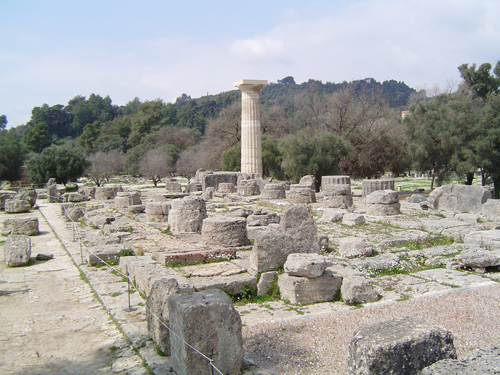The XXXIst Olympic Games kick off in Rio de Janeiro this weekend so we thought it a timely moment to take a look at where it all began for the Olympic movement. In the first of a two part account, DAVID ADAMS this week takes a look at the ancient Olympic Games…


OLYMPIC PAST: Remains of the Temple of Zeus in Olympia. PICTURE: Ryan Vinson/www.freeimages.com.
The Olympics have a long and storied history which dates back to well before the birth of Christ. The first recorded Olympics are dated to 776 BC and, held as part of a festival dedicated to the god Zeus, they were staged on the plains of Olympia on the western Peloponnese peninsula in what is now Greece.
Athletes, who competed naked, had to be male, Greek (up until 146 BC when, after the Romans conquered Greece, they too, joined in), and freeborn. The sports grew to include running events (including a race in armour), wrestling, boxing, pankration (a combination boxing and wrestling sport), and the pentathlon (five events – running, long jump, discus, javelin and wrestling) – all of which were held in the stadium. There were also equestrian events, such as horse and chariot races, which were held in the hippodrome.
Special messengers, known as spondophores, travelled from city to city to announce the date of the competitions and the five day Games and the period around them were protected by an Olympic Truce (ekecheiria), which had its origins in the 9th century BC, under which athletes, artists and their families, as well as other pilgrims going to the Games, were able to travel safety to and from the Games.
The winners (there were no rewards for second or third place getters) were recognised both immediately after their event but also at a ceremony on the last day of the Games when they were announced by a herald and a crown made of an olive branch, known as a kotinos, placed on their head.
Among the most famous athletes to compete at the Games were the wrestler Milo of Croton who won six times, Theogenes of Thassos, a champion in boxing and pankration, and runner Leonidas of Rhodes.
The site of Olympia was divided into sacred and secular sections. The former consisted of temples, altars and treasuries for offerings while the latter, which stood outside a wall, contained competition sites like the stadium and hippodrome as well as training facilities like a gymnasium and palaestra (a school for wrestling). It’s estimated that more than 40,000 people would descend on the site for the Games.
The ancient Olympics, which were the inspiration for a number of other ‘games’ held across Greece in ancient times known collectively as the Panhellenic Games, continued to be held every four years – a period known as an Olympiad – for almost 1,200 years until, eventually, the Christian Roman Emperor Theodosius banned what he described as a “pagan cult” in 393 AD.
Olympia, the site where the games had always been held, fell into disrepair after the banning of the Games and was eventually lost until it was rediscovered by Englishman Richard Chandler in 1766. In 1875, Germans carried out archaelogical digs on the site with the permission of the Greek authorities, and it’s said the discoveries made there were among the factors which inspired Pierre de Coubertin to create the modern Olympics. But more of that next week.





